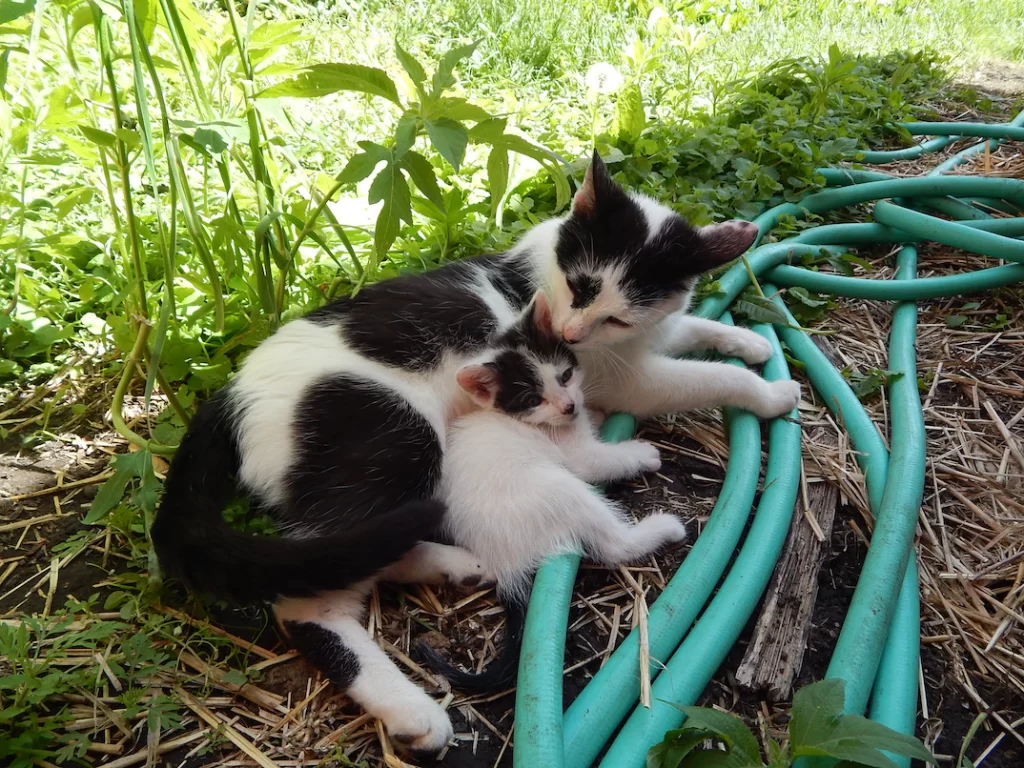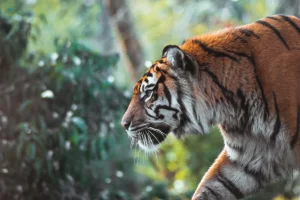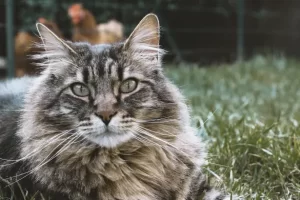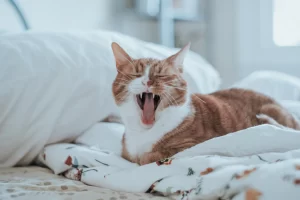Last updated on January 30th, 2023 at 12:33 am

Introduction
Cats have a deep love for their kittens, often going to great lengths to care for them. A mama cat might create a special bed for her babies by gathering warm fabrics and fur pieces she finds around the house. She may guard them constantly, ensuring no other animal or human disturbs her cherished brood. If a cat is not able to take proper care of all of her kittens, she will find another mother-figure in the vicinity who can provide the necessary nurturing and protection for her extended family. Cats are devoted and tireless in their efforts to make sure that each one of their little ones has access to warmth, food, and safety. It’s truly heartwarming to observe feline mothers at work; they do everything they can to ensure their kittens’ well-being and happiness.
Do Cats Love Their Kittens?
Cats are known for their independence and sometimes aloof nature, but when it comes to their offspring, cats are devoted parents. From the moment a kitten is born, even if it wasn’t wanted or planned for, protective maternal (or paternal) instincts kick in and the parent cat will dote on its litter with attention and patience. Silence between mother and child is often replaced with rumbles of purrs as the mother cuddles her young. Even during the weaning period when the kittens become more independent, they often still lap up all that love from their parent cat. Indeed, although cats aren’t prone to demonstrative displays of affection like dogs tend to be, it’s clear that cats do have an abundance of love for their kittens.
Cats are one-of-a-kind creatures who respond differently to love and attention than other animals. It’s possible that some cats are exceptionally loving and attentive to their kittens, while others aren’t nearly as interesting or as attentive. Whether or not mother cats feel any sort of attachment to their offspring is a topic of heated controversy. There is debate over whether or not cats form attachments to their offspring. The vast majority of studies show that cats form attachments to their kittens, while individual cats may show varying levels of dedication. While some cats only show mild signs of attachment, others develop strong bonds with their offspring and devote considerable resources to raising them.
Do Cats Recognize Their Kittens?
One of the benefits of having a mother cat is that she can tell you which of her kittens are which. However, it will only last so long as they are in her company. Cats are more attuned to smell than sight when it comes to identifying their young. If the kittens are with their mother, the household will continue to smell like a litter of kittens. Because of this, domesticated cats like to spend a lot of time cuddling and grooming one another.
When a mother cat hears her baby crying, she immediately remembers them. It has been observed that mother cats have a distinct “call” for each of their kittens. In the event of a kitten being taken away from its mother, the two will forget each other. The natural instinct of a mother in this situation is to start looking for her child. But a cat’s maternal love isn’t limited to its own young. Kittens are like children to them, therefore they show unconditional love to any and all in their presence. Both mom and baby kitten can suffer from separation anxiety. But there’s no need to worry. They will most likely recover from it within a month or so.
Male cats’ perspectives of their offspring can be influenced by the circumstances of their birth. Every colony of feral or stray cats is different because, for instance, male and female cats have different hierarchies with one another. Although domestic cats may prefer to keep to themselves, feral and stray cats can and do establish social groups.
Queen cats (female cats) and their young rule these colonies. A tomcat’s primary interest is protecting the region it has marked with its urine. Veterinarian Debra Horwitz claims that “cats will mark their area to communicate ‘ownership,'” as well as to “advertise sexual receptivity and availability.”
So, during the breeding season, fathers often don’t help raise their own offspring and instead rely on the collective care provided by the colony. Male cats are not as likely to recognize their offspring as females are because they are not around to become accustomed with their scent.
To be clear, it is possible for a queen to give birth to a litter that includes offspring from more than one male. This phenomenon, known as “heteropaternal superfecundation,” is more typical of metropolitan areas than of rural colonies.
Thus, tomcats are less likely to recognize their own litter if the mother cat has given birth to kittens by more than one male cat. Additionally, some female cats may try to prevent inbreeding by not mating inside their own group, which can make it very challenging for tomcats to identify their own.
All these things are part of life in a feral colony, but they may change drastically if indoor housecats start reproducing. The father is quite likely to recognize his offspring due to their close closeness and the scarcity of male cats.
Do Male Cats Love Their Kittens?
Male cats may not be quite as attentive to their kittens as their female counterparts, but that doesn’t mean they don’t love them. Male cats can strongly bond with their kittens regardless of which gender the kitten is. They often take a protective stance when hostile males are around, marking off the territory with scent and vocal communication to keep them safe. At the same time, male cats also provide useful life lessons in a very entertaining way – chasing away any potential predators or threats while teaching skills like hunting, scavenging and self-defense in an amusing way. Male cats may not always show it in the same manner as females, but they absolutely do care for and love their kittens.
Do Cats Protect Their Kittens?
Cat mothers are fiercely protective of their kittens and will go to great lengths to ensure their safety. Feline mothers will look for a safe environment for her kittens, such as an enclosed, quiet space with warmth and shelter from the elements. In order to keep her kittens’ safe from predators, she may move them several times until she chooses the most secure spot. Cats are also known for utilizing their signature hunting tactics when it comes to protecting their young. They use surprising agility and stealthy movements when defending against potential danger, which can be quite intimidating. In general, cats are incredibly dedicated parents who take the well-being of their offspring seriously and strive to keep them out of harm’s way.
Do Cats Become Depressed When Their Babies Are Taken Away?
The bond between a parent cat and her kittens can be incredibly strong, so it’s only natural to ask if cats may suffer from depression if their kittens are taken away. Recent studies show that cats become distressed when separated from their loved ones, suggesting that they understand the concept of loss. Some experienced owners have even seen changes in their cat’s behavior after the removal of a beloved kitten – such as increased meowing, refusing to eat and engaging in less activity. To give your feline friend the best quality of life, always think twice before taking away one of her babies.
Conclusion
Cats are considered some of the most loving and caring animals, and this devotion is especially apparent among mothers and their kittens. A mother cat will work tirelessly to provide comfort and safety to her offspring, whether that means carrying them around in her mouth or nursing them with keen attentiveness. This earnest love for her cats often manifests in the form of purring against each kitten, as well as protecting them from external threats with territorial ferocity. One of the most beautiful displays of a mother feline’s affection is her doting cuddles during sleep time; she’ll give each kitten an individual embrace before taking positions of watchful guardianship for the night. Such intimate expressions of tenderness show that cats may be one of the best examples out there when it comes to unconditional parental love.


